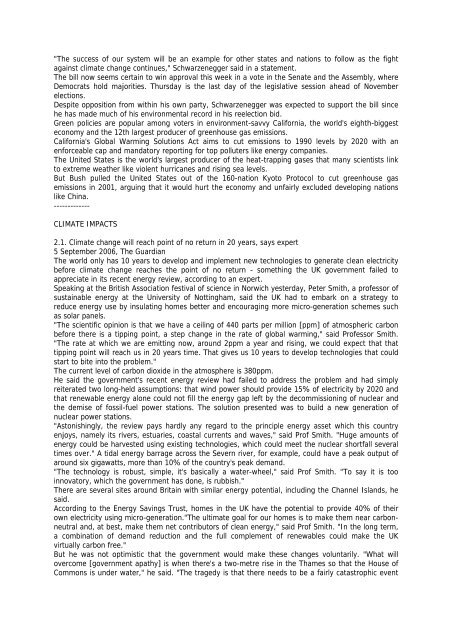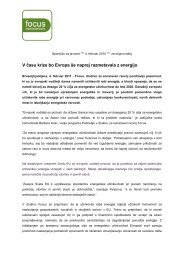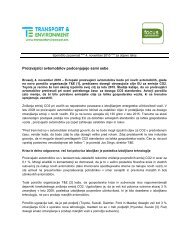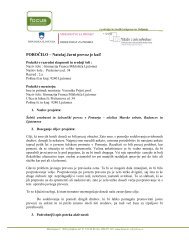E-news update September 5 2006 In this issue: ENERGY ... - Focus
E-news update September 5 2006 In this issue: ENERGY ... - Focus
E-news update September 5 2006 In this issue: ENERGY ... - Focus
You also want an ePaper? Increase the reach of your titles
YUMPU automatically turns print PDFs into web optimized ePapers that Google loves.
"The success of our system will be an example for other states and nations to follow as the fight<br />
against climate change continues," Schwarzenegger said in a statement.<br />
The bill now seems certain to win approval <strong>this</strong> week in a vote in the Senate and the Assembly, where<br />
Democrats hold majorities. Thursday is the last day of the legislative session ahead of November<br />
elections.<br />
Despite opposition from within his own party, Schwarzenegger was expected to support the bill since<br />
he has made much of his environmental record in his reelection bid.<br />
Green policies are popular among voters in environment-savvy California, the world's eighth-biggest<br />
economy and the 12th largest producer of greenhouse gas emissions.<br />
California's Global Warming Solutions Act aims to cut emissions to 1990 levels by 2020 with an<br />
enforceable cap and mandatory reporting for top polluters like energy companies.<br />
The United States is the world's largest producer of the heat-trapping gases that many scientists link<br />
to extreme weather like violent hurricanes and rising sea levels.<br />
But Bush pulled the United States out of the 160-nation Kyoto Protocol to cut greenhouse gas<br />
emissions in 2001, arguing that it would hurt the economy and unfairly excluded developing nations<br />
like China.<br />
-------------<br />
CLIMATE IMPACTS<br />
2.1. Climate change will reach point of no return in 20 years, says expert<br />
5 <strong>September</strong> <strong>2006</strong>, The Guardian<br />
The world only has 10 years to develop and implement new technologies to generate clean electricity<br />
before climate change reaches the point of no return - something the UK government failed to<br />
appreciate in its recent energy review, according to an expert.<br />
Speaking at the British Association festival of science in Norwich yesterday, Peter Smith, a professor of<br />
sustainable energy at the University of Nottingham, said the UK had to embark on a strategy to<br />
reduce energy use by insulating homes better and encouraging more micro-generation schemes such<br />
as solar panels.<br />
"The scientific opinion is that we have a ceiling of 440 parts per million [ppm] of atmospheric carbon<br />
before there is a tipping point, a step change in the rate of global warming," said Professor Smith.<br />
"The rate at which we are emitting now, around 2ppm a year and rising, we could expect that that<br />
tipping point will reach us in 20 years time. That gives us 10 years to develop technologies that could<br />
start to bite into the problem."<br />
The current level of carbon dioxide in the atmosphere is 380ppm.<br />
He said the government's recent energy review had failed to address the problem and had simply<br />
reiterated two long-held assumptions: that wind power should provide 15% of electricity by 2020 and<br />
that renewable energy alone could not fill the energy gap left by the decommissioning of nuclear and<br />
the demise of fossil-fuel power stations. The solution presented was to build a new generation of<br />
nuclear power stations.<br />
"Astonishingly, the review pays hardly any regard to the principle energy asset which <strong>this</strong> country<br />
enjoys, namely its rivers, estuaries, coastal currents and waves," said Prof Smith. "Huge amounts of<br />
energy could be harvested using existing technologies, which could meet the nuclear shortfall several<br />
times over." A tidal energy barrage across the Severn river, for example, could have a peak output of<br />
around six gigawatts, more than 10% of the country's peak demand.<br />
"The technology is robust, simple, it's basically a water-wheel," said Prof Smith. "To say it is too<br />
innovatory, which the government has done, is rubbish."<br />
There are several sites around Britain with similar energy potential, including the Channel Islands, he<br />
said.<br />
According to the Energy Savings Trust, homes in the UK have the potential to provide 40% of their<br />
own electricity using micro-generation."The ultimate goal for our homes is to make them near carbonneutral<br />
and, at best, make them net contributors of clean energy," said Prof Smith. "<strong>In</strong> the long term,<br />
a combination of demand reduction and the full complement of renewables could make the UK<br />
virtually carbon free."<br />
But he was not optimistic that the government would make these changes voluntarily. "What will<br />
overcome [government apathy] is when there's a two-metre rise in the Thames so that the House of<br />
Commons is under water," he said. "The tragedy is that there needs to be a fairly catastrophic event













